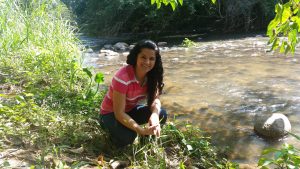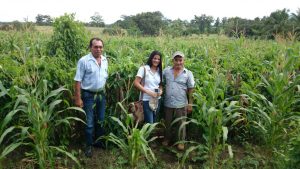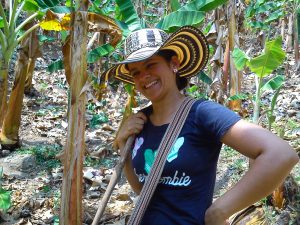Working for farmers
Yecenia Vega (‘05, Colombia) has always been clear: she strives to improve farmers’ lives by giving them the tools to make better decisions in the fields, ensure their products are of the highest quality, and have access to competitive markets. Since graduating from EARTH, she has worked with her country’s Ministry of Agriculture for nine years and has directed Colombia’s National Horticulture Plan for the past seven years. We interviewed Yecenia to learn more about her mission, her daily work, and its impact on the lives of thousands of Colombians.

Portrait of Yecenia.
What is the National Horticulture Plan about?
The project serves small- and medium-scale fruit and vegetable farmers in Colombia. We work in 23 of the country’s 32 administrative regions (departments), and each year, we assist a specific number of farmers. For example, in 2022, we are serving about 14,300 fruit and vegetable farmers. The project has two central axes: the first is integrating the farmers in technology and technical assistance. The second involves a social business component in which we encourage farmers to form cooperatives to strengthen their technical skills and commercial partnerships. We aim for them to have robust marketing channels to get the best market values and positioning for their fruits and vegetables.
How has the project evolved?

Working with the farmers.
This project has been in place for ten years. The results have been significant because we have given small producers access to markets, including those that are specialized. We focus a lot on quality certifications, such as obtaining Rainforest Alliance good agricultural practices certificates for each organic farm registration, depending on the market niche where we see an opportunity for them to market their products.
And we have managed to grow not only in sales in the national market but also in international markets. That has been the project’s greatest impact – getting these small farmers, who farm half a hectare or less than half a hectare, to group together and export their fruits and vegetables.
What is your role as Plan coordinator?
I am in charge of all 23 departments in Colombia where the project is being executed. In the seven years that I have been involved, I have been in charge of leading the actions and directing the implementation in the country. I have also had the opportunity to be in direct contact with the farmers we serve. Every week I travel and am in the field with the farmers, observing their feedback on our departmental teams’ processes and seeing how we can further strengthen the actions in everything we do.
How did your training at EARTH affect your professional life?
 Studying at EARTH is truly an experience. It is an opportunity that strengthens you both technically and socially because when you have to live with people from different countries and cultures, living daily with the same people, you enhance interpersonal relationships. I think that’s invaluable. I wish all students had the opportunity to have that diversity and learn to accept others as they are because that removes many prejudices. And in this field, where you have to work with people from so many economic conditions, EARTH gives you a broad spectrum of what you can contribute to society. It helps you accept everyone regardless of culture, language, and way of being.
Studying at EARTH is truly an experience. It is an opportunity that strengthens you both technically and socially because when you have to live with people from different countries and cultures, living daily with the same people, you enhance interpersonal relationships. I think that’s invaluable. I wish all students had the opportunity to have that diversity and learn to accept others as they are because that removes many prejudices. And in this field, where you have to work with people from so many economic conditions, EARTH gives you a broad spectrum of what you can contribute to society. It helps you accept everyone regardless of culture, language, and way of being.
We thank Yecenia for working so hard for her country’s farmers and for being an inspiration to future change agents.




